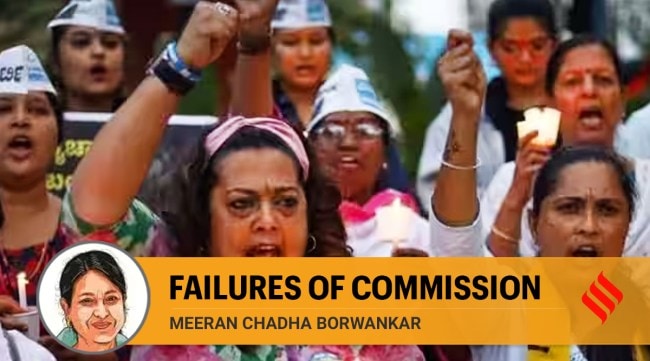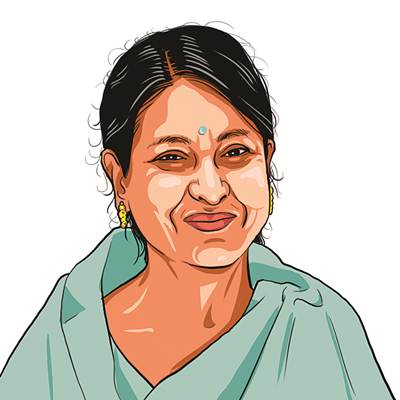Opinion On Manipur video, where Women’s Commission went wrong
They are bogged down by too much paperwork, too few field visits, and political appointments.
 The commissions are expected to “investigate and examine all matters relating to the safeguards provided for women under the Constitution and other laws. (Express File Photo/ Representational Image)
The commissions are expected to “investigate and examine all matters relating to the safeguards provided for women under the Constitution and other laws. (Express File Photo/ Representational Image) Women’s commissions in India were set up with a lot of fanfare and high expectations. However, a review of their working and responses to the issues of women is long over-due. The cases of molestation and rape of women in Manipur have brought them into focus. The Manipur saga is one of cruel disregard and contempt for human dignity and human rights. It is not the issue of women alone. Not just the women of one state, all of us are feeling let down. A similar review of the Human Rights Commissions, too, is called for.
Established in 1992, as per the National Commission for Women Act 1990, the commission is expected to take up the concerns of women at the national level. Each state also has its own commission. They are expected to consist of “persons of ability, integrity and standing who have had experience in law or legislation, trade unionism… committed to increasing the employment potential of women, administration, economic development, health, education or social welfare.”
The Manipur State Commission for Women (MSCW) was constituted in September 2006 as a statutory body as per the Manipur State Commission for Women Act, 2006. It is mandated to safeguard the interests of women with a wide mandate that covers all aspects of women’s development. Protection from sexual assault, I am sure, is covered under it.
The commissions are expected to “investigate and examine all matters relating to the safeguards provided for women under the Constitution and other laws.” They are also mandated to look into complaints and take suo motu notice of matters relating to “deprivation of women’s rights, non-implementation of laws enacted to provide protection to women”.
In the case of Manipur, the national commission, by its own admission, had received a large number of complaints and forwarded them to the state. Amid the turmoil, the state police or its other wings probably ignored the forwards or did not have time to do justice to each of them. They should be heard and held accountable. But if the commission, by its own admission, was inundated with complaints, would merely “forwarding” them be the right course of action? Should it not have sieved through and handled them urgently, as per the gravity of each complaint? Should they not visit regions and towns from where they are receiving the multitude of complaints?
As a former police officer I am conscious of the fact that such visits by dignitaries increase the work-load of the already overworked force. Yet I would recommend visits, and not the flying ones, but those made with an intention to stay for long durations and study the situation. Strengthen the hands of law enforcing agencies instead of taking on an adversarial role. And concentrate on providing physical, emotional, legal and psychological aid to women in distress. Representatives of women’s and human rights’ commissions can achieve a lot by their soothing presence. Manipur is a missed opportunity.
A serious issue that has bothered many of us is whether women’s commissions at the national and state levels have become toothless tigers, merely pushing papers around. Members and staff in different commissions of the country seem busy more in paper work, failing to prioritise field visits over files. But the visits should, of course, not be like that of a high court judge recently, demanding the presence of officials during a train journey. Media and the chief justice have rightfully come down against this stark example of the VIP mindset. Members of human rights’ and women’s commissions need to get a sense of reality in order to empathise with the suffering of citizens.
Besides too much of paper work and too few field visits, another grave issue is the political appointments in the commissions. Since they are nominated by the political party in power, most of the commissions are wary of even minor criticism of the government. And they are sometimes over-enthusiastic in taking up states ruled by the Opposition. Irrespective of the party in power, this has become the culture of the nation. However, commissions and their working can be made purposeful by advertising the posts of chairpersons and members. Individuals who are genuinely interested and capable would then be selected by a committee. Members of the Opposition, judges from the Supreme Court, civil society organisations and the ruling party can form the selection committee. Will political parties be ready for this change in appointments that is in public interest?
A social audit of the performance of different commissions by competent external agencies on a regular basis would give citizens an idea of their actual working. A taxpayer has a right to find out whether the money she is paying is being used properly or half-heartedly or being squandered altogether. My understanding is that commissions are not squandering the money but are not doing justice to their mandate either. They are caught up in loyalty for their “political bosses” and in a rigmarole of files and paper pushing. They are not ignorant of the ground reality but are averse to introspection followed by concrete action, though they do not miss any opportunity to pull up those working in the field.
It is time for members of women’s commissions and their colleagues in other commissions to come out of their air-conditioned chambers, dust off their shoes and embark on the rough roads of real India. On the sexual assault of women in Manipur, I would advise commission members to go through what one of the most sensitive poets of Punjab, Amrita Pritam, wrote. We only have to substitute Manipur for Punjab.
Ajj aakhan Waris Shah nu, kitthon kabraan wicchon bol/ Te ajj kitab-e-ishq da, koi agla varka phol/ Ik roi si dhi Punjab di, tu likh-likh mare vain/ Ajj lakhan dhiyan rondiyan, tainu waris shah nu kain ‘uth’… Today I say to Waris Shah, speak from your grave, and open a new page of the book of love. You had written the whole saga on the crying of only one daughter (Heer) of Punjab. See, today, millions of crying daughters of Punjab are calling you, ‘rise’!
The writer retired as DG Bureau of Police Research & Development






